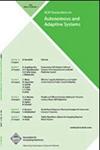Autonomic Provisioning with Self-Adaptive Neural Fuzzy Control for Percentile-Based Delay Guarantee
IF 2.2
4区 计算机科学
Q3 COMPUTER SCIENCE, ARTIFICIAL INTELLIGENCE
ACM Transactions on Autonomous and Adaptive Systems
Pub Date : 2013-07-01
DOI:10.1145/2491465.2491468
引用次数: 36
Abstract
Autonomic server provisioning for performance assurance is a critical issue in Internet services. It is challenging to guarantee that requests flowing through a multi-tier system will experience an acceptable distribution of delays. The difficulty is mainly due to highly dynamic workloads, the complexity of underlying computer systems, and the lack of accurate performance models. We propose a novel autonomic server provisioning approach based on a model-independent self-adaptive Neural Fuzzy Control (NFC). Existing model-independent fuzzy controllers are designed manually on a trial-and-error basis, and are often ineffective in the face of highly dynamic workloads. NFC is a hybrid of control-theoretical and machine learning techniques. It is capable of self-constructing its structure and adapting its parameters through fast online learning. We further enhance NFC to compensate for the effect of server switching delays. Extensive simulations demonstrate that, compared to a rule-based fuzzy controller and a Proportional-Integral controller, the NFC-based approach delivers superior performance assurance in the face of highly dynamic workloads. It is robust to variation in workload intensity, characteristics, delay target, and server switching delays. We demonstrate the feasibility and performance of the NFC-based approach with a testbed implementation in virtualized blade servers hosting a multi-tier online auction benchmark.基于百分位延迟保证的自适应神经模糊自动供给
为保证性能而自主提供服务器是Internet服务中的一个关键问题。保证流经多层系统的请求将经历可接受的延迟分布是具有挑战性的。困难主要是由于高度动态的工作负载、底层计算机系统的复杂性以及缺乏准确的性能模型。提出了一种基于模型无关自适应神经模糊控制(NFC)的服务器自主配置方法。现有的模型无关模糊控制器是在试错的基础上手工设计的,在面对高度动态的工作负载时往往是无效的。NFC是控制理论和机器学习技术的混合体。它能够通过快速在线学习自构建结构和自适应参数。我们进一步增强NFC以补偿服务器切换延迟的影响。大量的仿真表明,与基于规则的模糊控制器和比例积分控制器相比,基于nfc的方法在面对高动态工作负载时提供了更好的性能保证。它对工作负载强度、特征、延迟目标和服务器切换延迟的变化具有鲁棒性。我们通过在托管多层在线拍卖基准的虚拟化刀片服务器上的测试平台实现来演示基于nfc的方法的可行性和性能。
本文章由计算机程序翻译,如有差异,请以英文原文为准。
求助全文
约1分钟内获得全文
求助全文
来源期刊

ACM Transactions on Autonomous and Adaptive Systems
工程技术-计算机:理论方法
CiteScore
4.80
自引率
7.40%
发文量
9
审稿时长
>12 weeks
期刊介绍:
TAAS addresses research on autonomous and adaptive systems being undertaken by an increasingly interdisciplinary research community -- and provides a common platform under which this work can be published and disseminated. TAAS encourages contributions aimed at supporting the understanding, development, and control of such systems and of their behaviors.
TAAS addresses research on autonomous and adaptive systems being undertaken by an increasingly interdisciplinary research community - and provides a common platform under which this work can be published and disseminated. TAAS encourages contributions aimed at supporting the understanding, development, and control of such systems and of their behaviors. Contributions are expected to be based on sound and innovative theoretical models, algorithms, engineering and programming techniques, infrastructures and systems, or technological and application experiences.
 求助内容:
求助内容: 应助结果提醒方式:
应助结果提醒方式:


